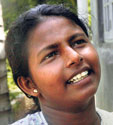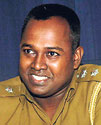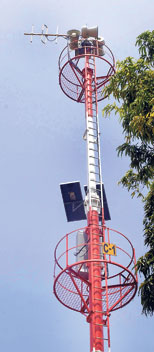“Amma, is a mean uncle coming on a boat from the ocean to break all the houses?” asked four-year-old Parami, after she was pulled out of bed by her parents who frantically scrambled out of their home in Patabendimulla, Ambalangoda around 1 a.m. last Sunday. Parami was trying to understand why the mention of tsunami sparked such pandemonium.
 |
 |
 |
| Rasika Nishanthi: The 2004 tsunami destroyed her house |
Abrew: Didn’t panic
this time |
HQI Hemal Prashantha: Ambalangoda police reacted promptly |
For her parents, last Sunday was a chilling reminder of the death and devastation that the mighty waves wrought on the island in 2004. “The tsunami destroyed our house completely, so when we heard the warning this time around, we got really scared,” says Parami’s mother K. W. Rasika Nishanthi.
“My husband was awakened when the Ambalangoda tsunami warning siren went off. He immediately woke us up saying a tsunami was going to strike. We didn’t take any of our belongings, apart from our daughter’s school things and some paper work, as we rushed out of the house,” says Nishanthi descriing the terrifying experience. The family ran to a small private hospital nearby, and stayed there for two hours before the signal rang once again, this time announcing that there was no threat of a tsunami striking Sri Lanka. The people of Ambalangoda heaved a collective sigh of relief.
Much like Parami’s parents most of those living along the coast even those in areas where the tsunami alert was not sounded, panicked and fled their homes when they heard the news of the earthquake off Nicobar Islands and the tsunami alert, many of them not even taking the time to lock their doors behind them.
Extreme panic can only cause confusion and can only worsen the situation says Assistant Director of the Disaster Management Centre (DMC) Pradeep Kodippili.
Describing how the tsunami warning system works, Mr. Kodippili explained that, first, the Meteorological Department, which is in contact with international tsunami monitoring bodies such as the Pacific Tsunami Warning Centre in Hawaii, informs the DMC in Colombo of the likelihood of a tsunami hitting the shores of Sri Lanka.
The Director of the Meteorology Department, S.H Kariyawasam says once they receive information from the international agencies and advisories, and if it is relevant to Sri Lanka they issue the tsunami watch advisory and warnings- depending on the earthquake and the potential of a tsunami.
“We read the message we get from the international monitors, and get it approved and then release it. The warnings towers are just one of the media we use to send out warning. In addition to that we have a text message based system called Disaster Early Warning System (DEWN). An SMS is sent to community leaders, district secretaries and various organizations located in vulnerable areas,” explains Mr. Kodippili.
At any given time at the DMC, at least six personnel can be found making sure everything is running smoothly. “They are here around the clock, 24 hours a day. So, no matter what the time is, we are prepared – always,” says Mr. Kodippili.
Once the DMC is alerted about a possible natural disaster, including earthquakes, cyclones, floods, etc., the entire staff gather at the Centre located at the BMICH, as each member has been designated a specific duty.
“We then find out which areas are actually under threat, as we don’t want to alarm people unnecessarily, and issue a ‘possible tsunami’ alert to these specific areas,” says Mr. Kodippili.
In the event of an earthquake that could potentially trigger a tsunami, a pre-recorded message that warns them is released. This initial message, according to Mr. Kodippili, is just an announcement and not an evacuation warning. However, as was observed in the coastal belt last Sunday, this message is all it takes for people to start panicking and run for their lives.
Kosgoda,was devastated by the December 2004 tsunami. So, naturally, its residents were not going to waste any time in responding to the threat.
R. Latha Malini, who heads a family of eight in the ‘tsunami housing scheme’ of Hiddaruwa, Kosgoda got a call from her brother in Balapitiya warning her of an impending death wave similar to the one that forced Malini and her loved ones to live in a camp for three long years.
 |
| A signal tower along the coast. |
“We just ran. We left everything behind, except maybe for a few clothes and just took off. We were very afraid,” she tells us.
Just a hop, skip and a jump away from Malini’s house, a gift from a non-governmental organisation, is a turtle hatchery.
Chandrasiri Abrew, who has been running this conservation project for 30 years, played his part in getting the message across and getting people to safety, just in case there was a repeat of the 2004 Boxing Day catastrophe.
“I was in Ambalangoda at the time. That’s where I live. I heard the alarm going off, and the first thing I did was call the hatchery and make sure that everyone in the vicinity got the message,” says Abrew.
Abrew’s business was badly shaken in the wake of the 2004 tsunami when the waves literally washed away the foundations of his business.
“I didn’t panic this time around. I made the right calls and made sure everyone was safe,” he says.
In Ambalangoda, where the signal from the tower went off following the earthquake, the police reacted promptly. Ambalangoda HQI Hemal Prashantha said his main concern, after making sure the people were safe and sound, was to ensure that no incidents of an unruly nature like looting or burglary took place in the midst of all the confusion.
“I sent my mobile unit around the area. There was a lot of fast moving traffic, people were out and about. Anything could have happened. My biggest worry was the possibility of criminal activity springing up in the middle of all that panic,” he said.
HQI Prashantha who was in the police quarters at the time, quickly put on his uniform and, with his team, was out and ready for action within minutes.
“There were a lot of people in the streets, carrying various belongings. Some even had their dogs in their arms. I knew these people carried valuables on them, and I wanted to provide them with security. We also got in touch with the business community to provide safety to all the businesses in the town area,” he said.
In areas like Beruwala and Bentota however, some residents complained that their alarm towers did not sound a warning following the earthquake, and some said that the Police were unaware of it until they informed them.
Mr. Kodipilli of the DMC however explains that these towers did not broadcast a message simply because there was no significant threat to those areas at the time. The Centre decided against warning the people in those areas, he said.
“The earthquake took place near the Nicobars off Eastern India. We did not want to create unnecessary panic in those areas near Kalutara,” he said. |





